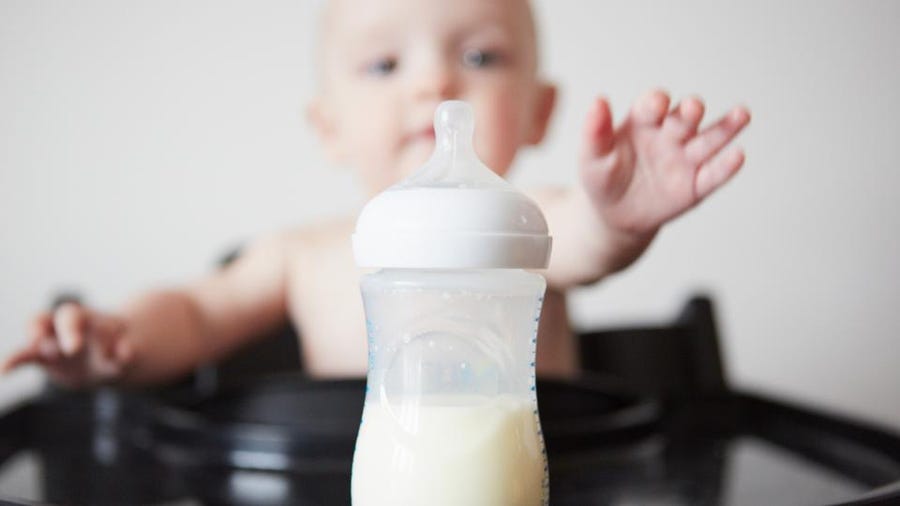Health
Complete Guide to Organic Baby Formula

A child’s early years are the most crucial for its physical and mental development. 85% of human brain development occurs by the age of 5, and height gain is about double the birth length. So proper diet in the early development years is very important.
Not every mother produces enough lactation for her baby. Although mother’s milk has no alternative, after a certain age, a baby’s diet needs to be changed to get more nutrients to supplement its body according to growing age.
The main purpose of milk like babymilkbar.com for babies is to provide them with enough nutrition value that they could get from eating solid foods. But babies can’t have solid foods until they reach a certain age. There comes a role of baby formulas which you can easily find in nearby grocery stores.
But you have to choose the best for your baby. We prefer organic and natural foods. Just like that, you need to choose organic baby formula for your baby. Let’s discuss organic baby formula.
According to Fortune Business Insights™, the global organic baby food market size was USD 5.55 billion in 2020. The market is projected to grow from USD 6.05 billion in 2021 to USD 12.22 billion in 2028 growing at a CAGR of 10.58% during the 2021-2028 period.
Table of Contents
What is Organic Baby Formula?
Organic baby formula is exactly what it sounds like; made up of all-natural ingredients and free from any pesticides and chemicals in all its processing. It should also be free from preservatives, synthetic coloring, growth hormones, and potentially toxic substances.
Some babies are just picky about their eating preferences. It becomes harder to cope with that issue. Organic baby formula should be the best alternative of nutritional value that your baby could get from organic solid foods.
Consult With Your Pediatrician
Before making any changes to your baby’s diet, consult with your pediatrician, to figure out whether or not your baby is allergic to any of the components in the formula.
You can also discuss with your pediatrician if your child has intolerances to a particular food, so you can buy that formula food that labels don’t have that specific food.
Why Choose Organic Baby Formula?
You might wonder why you choose organic baby formulas and whether there is any significant difference between organic and non-organic baby formulas out there?
Let me tell you there is a clear benefit to choosing organic food formulas over non-organic ones. Foods that are treated with pesticides affect the cognitive abilities of children. GMO crops are still shady, and we are not sure about their adverse outcomes in the longer run.
And foods which have links with growth hormones can cause some hormonal issues. So organic baby formula can be a safe way to supplement your baby’s physical requirements even though organic ones are costly but are worth it for your child’s well-being.
Consider Reading Components while Choosing Baby Formula
It is a good practice to read product labels thoroughly before buying. You should be cautious about what you are giving your baby to consume. You should make sure the baby formula contains a balanced amount of nutritional value and other necessary traced minerals recommended by the FDA.
Choose a formula food for your baby that is naturally derived and contains no artificial sweeteners. Also, make sure it is soy-free and contains probiotics that help the baby’s little belly in digestion and aids in extracting nutrients from the food.
Avoid baby formulas that contain soy oil, palm oil, corn syrup or glucose syrup, dioxin, or synthetic ingredients. A general rule of thumb is while selecting a baby formula, make sure it is FDA approved. Buy from a licensed and trustworthy brand.
How Much Formula You Should Feed Your Baby and How Often?
Every baby is different and so are their body requirements. But you can know exactly when your baby is hungry by figuring out general signs. For example, when the baby opens its mouth or starts crying. It’s a general indication it’s time to feed your baby.
According to your baby’s age, you need to give 1-2 ounces of milk every 2-3 hours if the baby is up to 2 weeks old. From 2 weeks old to 2 months old, you need to feed your baby 2 to 5 ounces of milk every 3-4 hours.
As infants get older, you can gradually increase the number of ounces of formula food according to their needs.

-

 Health5 years ago
Health5 years agoAdvantages and Disadvantages of Milk
-

 Tech4 years ago
Tech4 years ago6 Tips to Improving E-Commerce Websites
-

 Home5 years ago
Home5 years agoAdvantages and Disadvantages of Village Life in Points
-

 Travel5 years ago
Travel5 years agoAdvantages and Disadvantage of Travelling
-

 Sports4 years ago
Sports4 years agoThe benefits of playing an online live casino
-

 Tech5 years ago
Tech5 years ago10+ Advantages and Disadvantages of Mobile Phones in Points
-

 Tech5 years ago
Tech5 years agoEssay on Advantages and Disadvantages of Offline Shopping
-

 Tech5 years ago
Tech5 years ago8+ Advantages and Disadvantages of Motorcycle |Having Bike